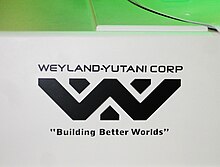Evil corporation

Anevil corporationis atropein popular culture that portrays a corporation as ignoringsocial responsibility,morality,ethics,and sometimeslawsin order to make profit for its shareholders.[1]In rare cases, the corporation may be well intentioned but extremist, engaging innoble cause corruption.
In fiction[edit]
The notion is "deeply embedded in the landscape of contemporary culture—populating films, novels, videogames, and more." The science fiction genre served as the initial background to portray corporations in thisdystopianlight.[1]
Evil corporations can be seen to represent the danger of combiningcapitalismwith largerhubris.[2]
Some notable uses of the trope include Atlas Corporation inCall of Duty: Advanced Warfare,Weyland-Yutani in theAlienfranchise,InGen in theJurassic Parkfranchise,and E-Corp inMr. Robot.
Real-world usage[edit]
Some real-world corporations have been accused of being evil. To guard against such accusations,Googleonce adopted the official motto "Don't be evil",although whether it was ever truly followed was a matter of debate - critics accused the company of" evil "acts such as secretdata collectionand violating customers' privacy, and political bias.[1][3]The motto was eventually moved to the very end of itscode of conduct,then removed entirely.[4]The New Yorkerwrote that "many food activists considerMonsanto(which later merged withBayer) to bethedefinitively evil corporation ".[5]
The Debate over Corporate Social Responsibilitywrote, "For many consumers,Wal-Martserves as the evil corporation prototype, but record numbers shop at the stores for low prices. "[6]
In Japan, a committee of journalists and rights activists issues an annual "corporate raspberry award" known as Most Evil Corporation of the Year Award (also called the Black Company Award) toa company "with a culture of overwork, discrimination and harassment".[7]
See also[edit]
- Anti-capitalism
- Anti-consumerism
- Anti-corporate activism
- Big Pharma conspiracy theory
- Business ethics
- Corporate crime
- Corporate warfare
- Criticism of capitalism
- Criticisms of corporations
- Cyberpunk
- Ethically disputed business practices (category)
- Human rights § Corporations
- Karen Silkwood
- List of corporate collapses and scandals
- Megacorporation
- Military–industrial complex
- Multinational corporation
- Organized crime
- Prison–industrial complex
- Psychopathy in the workplace
- Shareholder primacy
- State crime
- State-corporate crime
- The Corporation(2003 film)
References[edit]
- ^abcAllan, Angela (April 25, 2016)."How the 'Evil Corporation' Became a Pop-Culture Trope".The Atlantic.RetrievedJanuary 11,2017.
- ^McHenry, Jackson (August 26, 2015)."Mr. Robot's Chilling Message: Every Corp Is E Corp ".GQ.RetrievedJanuary 11,2017.
- ^Thompson, Cadie (2014-08-19)."Does 'Don't be evil' still apply to Google?".CNBC.Retrieved2023-05-07.
- ^Conger, Kate (18 May 2018)."Google Removes 'Don't be Evil' Clause from Its Code of Conduct".Gizmodo.
- ^Specter, Michael (November 4, 2013)."Why the climate corporation sold itself to Monsanto".The New Yorker.RetrievedJanuary 23,2017.
- ^Kendall, Brenden E.; Gill, Rebecca; Cheney, George (2007). "Consumer Activism and Corporate Social Responsibility: How Strong a Connection?". In May, Steven K.; Cheney, George (eds.).The Debate over Corporate Social Responsibility.Oxford University Press. p. 258.ISBN978-0-19-517883-8.
- ^Kikuchi, Daisuke (December 23, 2016)."Ad giant Dentsu declared Most Evil Corporation of the Year".The Japan Times.RetrievedJanuary 27,2017.
Further reading[edit]
- Decker, Mark T. (2016). "Ridley Scott Takes On Apparently Evil Corporations inAlien,Blade Runner,andPrometheus".Industrial Society and the Science Fiction Blockbuster: Social Critique in Films of Lucas, Scott and Cameron.McFarland. pp. 74–110.ISBN978-0-7864-9911-3.
- Sloane, S.B. (2002).Organizations in the Movies: The Legend of the Dysfunctional System.University Press of America.ISBN978-0-7618-2434-3.
External links[edit]
- Sample list of evil corporations in filmatMTV
- Sample list of evil corporations in science fictionArchived2017-02-05 at theWayback MachineatPC World
- Sample list of evil corporations in science fiction booksatBarnes & Noble
t
